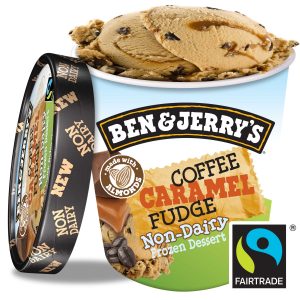Ice cream, on-demand

Unilever has partnered with Toronto-based grocery delivery service Urbery on a pint-sized promotion that puts two of its new frozen desserts in customers’ hands in less than an hour.
The packaged goods giant is using Urbery to help introduce two dairy-free additions to its Ben & Jerry’s lineup: P.B. & Cookies and Coffee Caramel Fudge. They join established flavours Cherry Garcia, Half-Baked and Chocolate Chip Cookie Dough on the curbside delivery service.
Urbery is offering the new flavours in advance of their official store release on Feb. 27. The non-dairy pints sell for $9.99, while regular flavours sell for $8.99. Urbery also charges a $4.99 delivery fee, which is waived if customers order three or more pints.
Unilever first partnered with Urbery last fall on a promotion called Dough-to-Door, which used chatbots on Ben & Jerry’s Facebook page to facilitate orders. This time, transactions are being conducted via a dedicated website offering delivery in downtown Toronto within 30-45 minutes. The service operates daily between 5-10 p.m.
Jessica Armstrong, director, digital ecommerce and omnichannel for Unilever in Toronto, declined to say how many pints of Ben & Jerry’s Unilever sold through Urbery last year, but says the pilot project exceeded its expectations in terms of both volume and engagement.
Armstrong says several factors contribute to the effectiveness of the direct-to-consumer approach, including the impulse nature of the category and brand combined with “unparalleled” brand loyalty and a concentrated fan base within Toronto.
She says Unilever’s direct-to-consumer efforts are a “strategic pillar” for the brand globally, as it looks to strengthen its relationships with customers. “We’re open to trying this across a number of different brands within our portfolio,” she says. “It’s less about whether they are new or not, and more focused on the consumer proposition.”

Urbery founder and CEO Mudit Rawat says brands are increasingly empowered by technology, which is enabling them to bypass traditional retail channels and sell directly to their customers.
“Ecommerce, mobile technology, chatbots or whatever the next big technology tool is out there is finally allowing these brands to go direct to consumer,” says Rawat. “Before it was hard because they had to all these retail-like things that they don’t have to do anymore.”
Rawat says Urbery’s business model continues to evolve, even predicting the relatively new on-demand segment could become a more significant part of its operation. He says the company has arranged other partnerships that will take effect later this year.
“There’s a lot of interest both in Canada and the U.S. in trying to figure out what the next direct-to-consumer model looks like,” he says. “Unilever bought Dollar Shave Club for $1 billion because it wants to figure out what direct-to-consumer looks like.”
Rawat points to the debut of services such as P&G's Tide Wash Club, which sends Tide Pods to customers as part of a monthly subscription plan, as an example of how the space is evolving.
“As these sorts of technology tools evolve, where customers can interact with brands on a chatbot or
